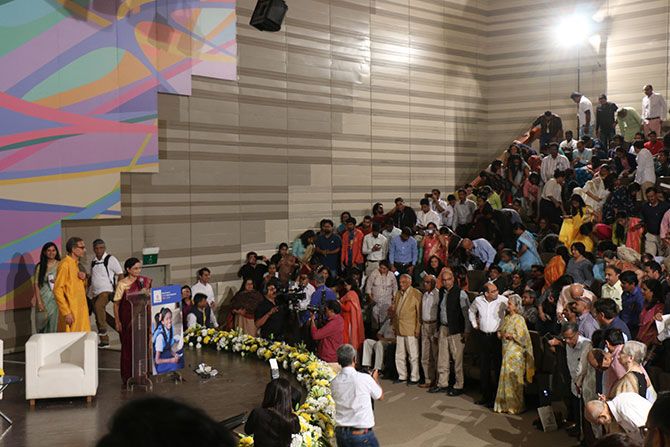What does Nobel Laureate Abhijit Banerjee thinks about India's education sector?
Text: Prasanna D Zore/Rediff.com. Photographs: Rajesh Karkera/Rediff.com

"Education, education, education..."
Every time some journalist attempts to steer the conversation away from the topic at hand, Nobel Laureate Abhijit Vinayak Banerjee gently, yet firmly, guides the discussion back to education, a subject he is so enamoured of.
The recipient of the Sveriges Riksbank Prize in Economic Sciences in Memory of Alfred Nobel 2019, popularly known as the Nobel Prize, was in Mumbai for the first time after becoming a Nobel Laureate.
Try to goad him to talk about JNU, or the wealth tax on the rich, of which he is a big votary, or about the current national political scene, Dr Banerjee, who received the Nobel Prize in Economics along with Esther Duflo (his wife; a well-known economist in her own right) and Michael Kremer, repeatedly, gently utters "education, education, education" to remind his questioners that he is open to queries only on the state of education in India and nothing else.
After a couple of lame attempts, journalists, who have been invited for a tete-a-tete with Dr Banerjee by Pratham, the non-government organisation that strives to improve the quality of Indian education, tweak their questions, albeit not without a spin on politics towards the education sector.
Both Dr Banerjee and Dr Duflo have had a close association with Pratham for more than 20 years and it was only apt that Dr Banerjee would speak on its 25th birthday on a topic close to his heart: Learning from evidence for a better future: The case for primary education at the Tata Institute of Social Sciences, Deonar, north east Mumbai.
***
When the interaction with the media begins at 2.15 pm instead of the scheduled 2 pm -- Dr Banerjee got a taste of the crawling Mumbai traffic that has worsened after the construction on various metros -- Abhijit (one gets the impression he prefers people address him by his first name instead of 'Dr Banerjee' or just 'Sir'), with his tall, lanky frame walks in dressed in a yellow kurta and black jeans.
Without much ado, the QnA with Abhijit, currently the Ford Foundation International Professor of Economics at the Massachusetts Institute of Technology, begins and one gets the chance to quiz the Nobel Laureate on education, education, education.
***

Ask him about the quality of education at the public and private schools, and Abhijit offers his insights:
"In terms of learning outcomes, there's almost no difference between them now," he says. "But then it is a fact that there are, of course, the elite private schools, which are great and extremely expensive and out of out of the hands of most people," he adds.
Just as one feels he is being tactful comes Abhijit's quick response.
"Do I think that you can aspire to doing better in the government system, relative to the average private school?" he wonders aloud.
"I think the Delhi public schools have done it actually. The results in the Delhi public school system, the government school system, not in municipal system, are better than the average private school in Delhi."
"The fact is Delhi government schools have now outperformed the Delhi private schools."
"But I think there is lots of scope for improvement as well," he says backed by his experience of conducting randomised control tests that focus on the evidence at hand and then takes measures to improve the outcomes in the field of education.
***
"Should the government increase education layout to help get the economy back on track and create jobs?" asks a reporter.
Immediately comes the next question, tinged with some politics, of course, and Abhijit offers his straightforward, yet loaded response.
"I would say the federal government has not a bigger role to play than state governments as education is a state subject, and state governments can have higher flexibility in dealing with challenges (related to the education sector)."
"My guess is that the real constraint is attention. And I think that you're right in worrying about whether the distraction from this (funding) will make the government less attentive towards education," says the economist who graduated from Calcutta University, has a post-grad degree from JNU and a doctorate from Harvard.
"In general, it is not that it (the federal government) is spectacularly attentive (to the education sector)," he quips, evoking laughter in the hall.
"But I think that the real issue is not money. In fact, there's almost no flexibility (on how the allocated budget is used up); the salaries and pensions eat up most of the budget."
"So it's not that you can change very much, you're always committed to paying those things. So it's a rather inflexible system," he exposes the reality of how most of the funds allocated to the sector end up.
Espousing the cause of infusing technology and intellectual capital to improve the state of education in Indian schools, colleges and universities, he says, "If we want to be a big player in technology and in the intellectual arena, then we need to invest more on education. I would say mostly we have now invested quite a bit."
"What is more important now is to take advantage of that (investment) by encouraging the research climate and inculcating an open and free education system and one entirely not guided by some 'national priorities'."
"Researchers know better what's useful to do then the government or the public," he says based on his experience as a researcher.
***

Time for the next question, please!
"What do you make of the mushrooming liberal arts universities, private ones, which are coming up in various pockets, many of them funded by the Indian Diaspora?"
"I'm very happy about that. And, do I really hate the idea that these are expensive and private? No," he says categorically championing the cause of public-private partnership in education.
"But relative to when I was growing up, I think the emphasis has shifted too far towards technical education. And I do feel that if you want to have a vibrant democracy, we need to have kind of a class of people who have broad based education and I think in that sense, the aspiration is a good one, an important one."
***
"If you were India's finance minister, what kind of resources would you allocate for the education sector? What are your expectations from the finance minister?" comes my politically loaded question disguised as one on education.
"The education sector mostly is not a finance minister's domain," Abhijit politely reiterates his view.
But then he has an opinion on what the role of the federal government should be and he doesn't flinch from making his view known.
"I think it's more important to undertake institutional reforms which are more the domain of the (Union) HRD (human resource department ministry) and are more important. I think the UGC (University Grants Commission) reform, generally of funding reform, so that we have funding systems which are more of the global standards where the funding is given based on one thing," he says and goes on to enlighten how the funding system operates in the US.
"What's very striking in the US is that National Institutes of Health, which has an enormous budget worth billions of dollars, and it is allocated by people who are the top professionals in those fields."
"If you look at who's who on the panel (which decides on the allocation of this budget in the US), they are the who's who of research. We need to sort of take government controls off these things more," he says.
And then he goes on to offer the reasons behind the success of the US education sector.
"The education sector is one of the places where the US model suggests it has been very successful, partly because it's been very open to entrepreneurs who come up with new ideas and new ways of doing research and just run with it and the government is somehow managed (kept off such decisions) over time. So I do feel that there is excitement in that world which we don't harvest enough."
"Would you suggest a roadmap to the finance minister for education sector reforms?" I ask.
But the Nobel Laureate has been there and done that all with much elan and honesty.
"I would start with these institutional reforms (in the education sector). Like, the syllabus does not need to be decided by the Centre."
"I can decide my own syllabus with no interference from anybody in the United States," he cites an example. "That's an excellent thing. The syllabus at every level is dictated by a set of committees of experts and professionals and that's what is actually useful or interesting or modern?"
"It's extremely important to start getting people who are active participants in the education sector more involved in locally deciding what's the right syllabus rather than heavy syllabi decided by some board (central) or the other."
By this time, it is time to move to the next venue, a few yards away from where the media meet is happening, and where scores of students, academics, and education experts are waiting to listen to Abhijit.
***

Many journalists have brought copies of Abhijit's books like What The Economy Needs Now (authored by Abhijit Banerjee, IMF Chief Economist Gita Gopinath, former RBI governor Raghuram Rajan and Mihir S Sharma) and Good Economics For Hard Times by Abhijit Banerjee and Esther Duflo.
The Nobel Laureate doesn't disappoint the assembled journalists as he signs the books with flourish. Only after signing off the last book does Abhijit head to the next venue.
***
Speaking at Pratham's 25th anniversary celebration, Abhijit enthralls his audience by going back into history and recounts the thrilling journey of how Pratham is helping improve the quality of education among India's underprivileged sections.
Speaking about the theme Learning from evidence for a better future: The case for primary education, Abhijit convinces his audience about the role evidence plays in improving outcomes by designing education solutions that work on the ground, irrespective of myriad challenges that educationists in India face.
When Pratham Co-Founder Farida Lambay asks for applause for Abhijit after he finishes his afternoon address, the audience gives him a standing ovation, much deserved for an Indian genius who, along with Esther Duflo and Michael Kremer, have trail-blazed their path in the world of economics with their experimental approach to alleviating global poverty.










